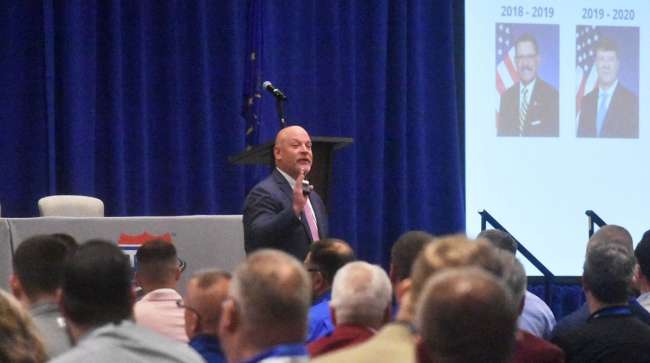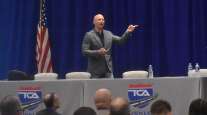Senior Reporter
Truckers Urged to Get Vocal on Regulatory Challenges

[Stay on top of transportation news: Get TTNews in your inbox.]
INDIANAPOLIS — Motor carriers are making strides in influencing the regulatory future of the industry, but must remain vigilant — and vocal — to address challenges they face in the short and long term, according to David Heller, the Truckload Carriers Association’s head of government relations.
In particular, he pointed to the prospect of adopting zero-emission vehicles amid looming regulatory mandates.
“One of the most important things that we in the industry need to start talking about is zero-emissions vehicles,” Heller said during a June 3 presentation at TCA’s 2024 Safety & Security Meeting. “There is not a person in this room that does not want to support the environment, but the reality is the rules are, realistically, a cart-before-the-horse scenario. The reality is there are a lot of boxes that first need to be checked before we go down this road for electric vehicles. And those boxes aren’t going to be checked anytime soon.”
Heller urged the audience to speak with regulators and legislators on the state and federal levels about these challenges, and how looming requirements will affect fleets’ businesses. In particular, he noted upcoming mandates in California related to zero-emission commercial vehicles.

“We are the big dogs on the road,” Heller said. “We have to make sure that the reliability is there, and the achievability and affordability are there. But it’s just not there yet.”
He noted, for example, that current charging infrastructure is inadequate, the cost of electric vehicles is out of reach for many carriers, and EV batteries increase the weight of trucks carrying goods. “We don’t all carry potato chips,” he joked.
Another lingering challenge for the trucking industry is a delay in a federal proposal for speed limiters on trucks. A supplemental notice of proposed rulemaking was due last month, but is still awaiting approval by the White House Office of Management and Budget. Heller noted this rule has been two years in the making, but the industry still lacks detail on a proposed speed setting or when one might become final.
Heller also cited other major issues facing the industry, including a need for more truck parking, the DEA’s proposal to downgrade marijuana on the scale of significant drugs, delays in regulatory approval for the use of hair samples for driver drug tests, fixes for driver detention time without pay, and tweaks to FMCSA’s Compliance, Safety, Accountability enforcement program.
“I’ve had meeting, upon meeting, upon meeting on Capitol Hill about truck parking,” Heller said. “Truck parking is even more of an issue than it was before. The number of parked trucks on highway exit ramps is increasing the number of accidents. In fact, 98% of drivers have reported not finding truck driving spaces. Drivers are losing over $7,000 a year looking for safe, secure parking spaces.”
Want more news? Listen to today's daily briefing above or go here for more info
Another concern is whether the National Highway Traffic Safety Administration will require side underride guards for large trucks. A special advisory committee tasked to come up with a recommendation on the issue has been bitterly divided.
Heller said the persistent wave of nuclear verdicts in accident litigation and predatory towing practices targeting truckers are also top-of-mind. He said truckers need to be aware of these challenges and speak up, even as regulators struggle with finding sufficient personnel and funding to stay on top of the issues.
“If you think trucking has a turnover problem, just look at the Federal Motor Carrier Safety Administration,” Heller said. “In the last six years, we’ve had six administrators.” But official appointment of the next administrator will likely have to wait until the presidential election is over in November, Heller said.




